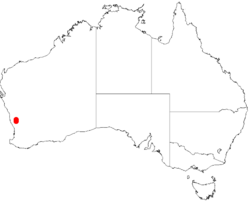Biology:Acacia aristulata
| Watheroo wattle | |
|---|---|
| Scientific classification | |
| Kingdom: | Plantae |
| Clade: | Tracheophytes |
| Clade: | Angiosperms |
| Clade: | Eudicots |
| Clade: | Rosids |
| Order: | Fabales |
| Family: | Fabaceae |
| Subfamily: | Caesalpinioideae |
| Clade: | Mimosoid clade |
| Genus: | Acacia |
| Species: | A. aristulata
|
| Binomial name | |
| Acacia aristulata Maslin
| |

| |
| Occurrence data from AVH | |
Acacia aristulata, also known as Watheroo wattle,[1] is a shrub belonging to the genus Acacia and the subgenus Phyllodineae endemic to Western Australia.
Description
The erect or scrambling shrub typically grows to a height of 0.25 to 1 metre (1 to 3 ft)[2] and with a width of up to 1 m (3 ft 3 in).[1] It blooms from September to December and produces lemon- yellow to creamy-white flowers.[2] The spherical flower heads can last until January or February and the seed pods take around a year to become mature.[1]
Taxonomy
The species was first formally described by the botanist Bruce Maslin in 199 as part of the work Acacia miscellany. The taxonomy of fifty-five species of Acacia, primarily Western Australian, in section Phyllodineae (Leguminosae: Mimosoideae) as published in the journal Nuytsia. It was reclassified as Racosperma aristulatum in 2003 by Leslie Pedley, then transferred back to the genus Acacia in 2005.[3]
Distribution
It is native to an area on the Lesueur sandplain in the Wheatbelt region of Western Australia.[2] The shrub is found between Moora and Watheroo and is known in four localities extending within a range of approximately 35 km (22 mi).[1]
Habitat
It is most often situated among rocky outcrops on top of low rocky ridges and hills growing in sandy-loamy-clay soils over granite and chert. The shrub is often a part of Allocasuarina woodland or low open shrubland communities. Species commonly associated with Acacia aristulata include Allocasuarina huegeliana, Diplolaena angustifolium, Dianella revoluta and Dryandra sessilis.[1]
See also
References
- ↑ 1.0 1.1 1.2 1.3 1.4 "Acacia aristulata — Watheroo Wattle". Species Profile and Threats Database. Department of the Environment and Energy. http://www.environment.gov.au/cgi-bin/sprat/public/publicspecies.pl?taxon_id=64822. Retrieved 21 March 2018.
- ↑ 2.0 2.1 2.2 "Acacia aristulata". FloraBase. Western Australian Government Department of Parks and Wildlife. https://florabase.dpaw.wa.gov.au/browse/profile/14051.
- ↑ "Acacia aristulata Maslin". Atlas of Living Australia. Global Biodiversity Information Facility. https://bie.ala.org.au/species/http://id.biodiversity.org.au/node/apni/2909621#names. Retrieved 21 March 2019.
Wikidata ☰ Q15289608 entry
 |


